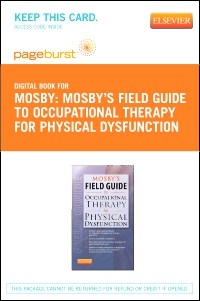
Mosby's Field Guide to Occupational Therapy for Physical Dysfunction - Elsevier eBook on VitalSource (Retail Access Card), 1st Edition
Elsevier eBook on VitalSource - Access Card

Now $39.89
An all-in-one resource covering the basics of point-of-care assessment and intervention, Mosby’s Field Guide to Occupational Therapy for Physical Dysfunction helps you master the skills you need to become competent in occupational therapy (OT) or as an occupational therapy assistant (OTA). It is ideal for use as a clinical companion to Mosby’s bestselling texts, Pedretti’s Occupational Therapy: Practice Skills for Physical Dysfunction and Physical Dysfunction Practice Skills for the Occupational Therapist Assistant. Expert information covers anatomy, assessment tools, screening tools, and more, and is provided in a compact format that’s easy to use on the go.
-
- A quick-reference format uses illustrations, charts, and tables to organize key data.
- Logical, easy-to-find sections are organized and based on the OT Framework covering evaluation, intervention, intervention plan, and service management, making it easy to find essential facts, procedures, and applications.
- UNIQUE! Expert Advice tips and Pearls provide helpful pediatric and geriatric information that can be applied in the clinical setting.
- Basic guidelines refer back to leading textbooks, Pedretti’s Occupational Therapy and Physical Dysfunction Practice Skills for the Occupational Therapist Assistant, for more detailed information.
- Coverage of all patient populations includes adult, pediatric, mental health, and neurological conditions.
- Convenient index makes it easy to locate tools you need to evaluate or treat a specific region or area.
- Pocket size and lay-flat binding provide convenience and portability for easy reference.
-
Section 1: Overview and Occupational Therapy Process
- The Occupational Therapy Practice Framework, 2nd Edition, and the Practice of Occupational Therapy for People with Physical Disabilities
- Application of the Occupational Therapy Practice Framework to Physical Dysfunction
- Health Promotion and Wellness for People with Physical Disabilities
- Teaching activities in Occupational Therapy
- Documentation of Occupational Therapy Services
- Infection Control and Safety Issues in the Clinic
Section 2: Occupational Performance and the Performance Areas: Evaluation and Intervention
- Wheelchair Selection
- Transfer Techniques
Section 3: Performance Skills and Client Factors: Evaluation and Intervention
- Assistive Technology
- Evaluation of Motor Control
- Occupation-Based Functional Motion Assessment
- Joint Range of Motion
- Evaluation of Muscle Strength
- Evaluation of Sensation and Intervention for Sensory Dysfunction
- Evaulation and Treatment of Visual Deficits Following Brain Injury
- Assessment and Intervention for Perceptual Dysfunction
- Evaluation and Treatment of Limited Occupational Performance Secondary to Cognitive Dysfunction
- Eating and Swallowing
Section 4: The Occupational Therapy Process: Implementation of Interventions
- Pain Management
- Orthotics
- Neurological Considerations for Traditional Sensorimotor Approaches to Intervention
- Motor Learning
Part 5: Intervention Applications
- Cerebrovascular Accident/Stroke
- Traumatic Brain Injury
- Spinal Cord Injury
- Disorders of the Motor Unit
- Arthritis
- Hand and Upper Extremity Injuries
- Hip Fractures and Lower Extremity Joint Replacement
- Low Back Pain
- Burns and Burn Rehabilitation
- Amputation and Prosthetic
- Cardiac and Pulmonary Disease
- Oncology
- Special Needs of the Older Adult
- HIV Infection and AIDS
- Polytrauma and Occupational Therapy

 as described in our
as described in our 